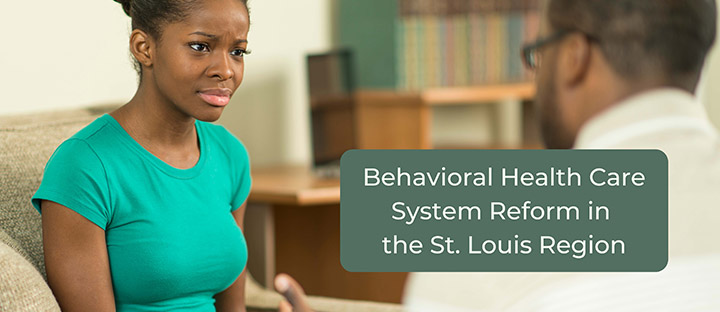In the St. Louis region, many individuals with serious mental illness and substance use disorder are not being adequately treated, resulting in an increased number of encounters in emergency departments (EDs) and the criminal justice system.
In response to this problem, the Saint Louis Metropolitan Hospital Council met in November 2017, and formally requested that the St. Louis Regional Health Commission (RHC) “serve as the coordinating entity” to explore the feasibility of a behavioral health assessment and triage center (BHATC). With funding from the Missouri Foundation for Health and in collaboration with the Behavioral Health Network (BHN), the RHC conducted a BHATC Feasibility Study in response to this call to action.
While the region clearly demonstrates a need for such a center, the BHATC Feasibility Study showed that sustaining a center is not feasible until we make back-end improvements to the behavioral health system.
The BHATC Feasibility Study highlighted three main system-wide barriers:
- Lack of geographic alignment of community mental health centers (CMHCs) to areas of highest need, as well as wide geographic dispersion of need
- Fewer services per capita provided to low-income individuals by St. Louis City and County CMHCs than Eastern region CMHCs, as well as lack of full utilization of the Department of Mental Health funding by St. Louis CMHCs
- Lack of crisis support services (housing, respite beds, staffed inpatient psychiatric beds)
Based on the findings, the feasibility study transformed into a broader agenda: to reform the region’s behavioral health care system. Pulling from the BHATC Feasibility Study, the BHN launched a Visioning Initiative to create system-wide transformation within a Recovery Oriented System of Care Framework. The BHN established three core aims and corresponding workgroups as part of this Visioning Initiative: enhance outreach and engagement, integrate access, and improve transition options.
Nearly all (94%) of the Feasibility Study planning committee members agreed that the critical functions of an assessment and triage center were accounted for in the BHN Visioning plans, and that the momentum and planning from the BHATC process was integrated into the Visioning work. Through this Visioning work, our region has established two major resources – the SSM Behavioral Health Urgent Care and the Sobering Center – to bolster the behavioral health care system and assist in ED and jail diversion.
The SSM Behavioral Health Urgent Care Center is the region’s first and only urgent care/walk-in clinic dedicated to mental health. The clinic treats both adults and children in urgent need of care for mental health crises. It provides immediate access to behavioral health care without the often long and costly wait for ED care to address non-emergent issues. The Behavioral Health Urgent Care is a one-of-a-kind collaboration with multiple community partners, bringing together the clinical expertise of SSM Health’s trusted behavioral health team and the comprehensive support of local mental health resources. The strategy behind developing the Urgent Care was to cultivate hospital/community partnerships to develop alternatives to the emergency department for urgent behavioral health issues. Addressing a wide range of severity and levels and service needs, such as bridging medications to determining inpatient hospitalization needs, the clinic is walk-in friendly, broadly open to the community, and serves adults and youth (ages 6+) for psychiatric and psychosocial care. Operating 7 days a week, 9 am – 7 pm, the Urgent Care has served over 1395 patients since its opening March 31, 2021.
The St. Louis region is also planning to open a sobering center to increase behavioral health care access and meet community need. A sobering center is a facility where actively intoxicated individuals can safely recover from acute intoxication while receiving basic medical monitoring. The center operates on a harm reduction model, meaning they are not providing detoxification or residential treatment, nor are they necessarily a direct connection to treatment. The sobering center is designed to divert intoxicated adults out of jail and EDs by providing a safe alternative.
St. Louis demonstrates a particular need for such a program due to a high frequency of alcohol-related substance abuse issues. Twenty-four percent of ED visits in St. Louis region are related to substance use or mental health, and of these patients, alcohol use is the third most frequent primary diagnosis. In addition, law enforcement officers often accompany patients for alcohol or other substance use, and without alternatives, these time-consuming processes can constrain police resources and contribute to jail booking times (> 2 hours).
At this time, the anticipated opening date (pending funding) of the sobering center is September 2021. The BHN is working with partners to establish clinical protocols, sustain funding, and educate the public, including law enforcement and hospitals, on referral options.
St. Louis should be proud. Community leaders implemented real change after analyzing data and unmet needs from the BHATC Feasibility Study. Over the past four years, the St. Louis region has made substantial strides toward improving the behavioral health care system. More work is needed to achieve an equitable, recovery-oriented network of care, but we are moving in the right direction.

